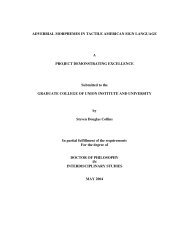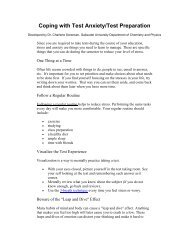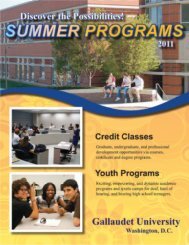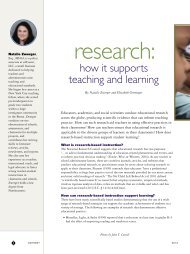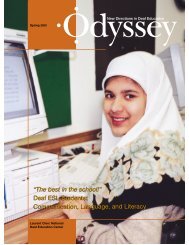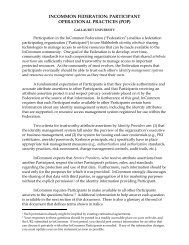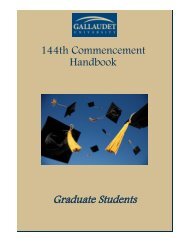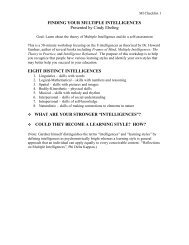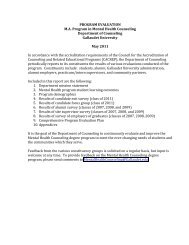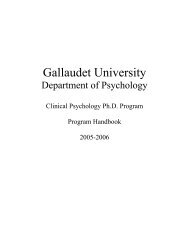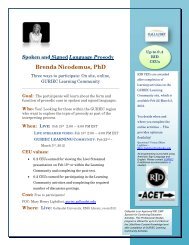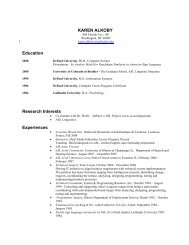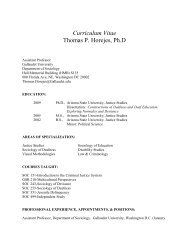practices - Gallaudet University
practices - Gallaudet University
practices - Gallaudet University
You also want an ePaper? Increase the reach of your titles
YUMPU automatically turns print PDFs into web optimized ePapers that Google loves.
Parents and caregivers and<br />
educators spent four intensive<br />
days identifying successful <strong>practices</strong>.<br />
Throughout the forum, parents and<br />
caregivers and educators emphasized<br />
specific themes:<br />
• Educators must view families as equal<br />
partners in the education of their child; this<br />
attitude must be reflected in everything that<br />
is done at school.<br />
• The deaf child must be empowered to<br />
function as a member of the family.<br />
• Parents and caregivers need unbiased<br />
information on a range of topics so they can<br />
make informed decisions.<br />
• Parents and caregivers need specific<br />
skills, such as how to participate effectively<br />
in their child’s Individualized Education<br />
Program meeting.<br />
• Extended family members need to be<br />
considered and included in planning and<br />
program structures.<br />
• Fathers need to be considered and included.<br />
• Programs need to provide a continuity of<br />
services at transition points throughout the<br />
child’s life.<br />
• Programs need to be flexible.<br />
• Programs need to include ongoing<br />
assessment of children and parents and<br />
caregivers.<br />
• Programs need to focus on literacy and<br />
communication.<br />
• Deaf staff members from a variety of<br />
cultural backgrounds functioning as equal<br />
team members are a critical program<br />
component.<br />
6<br />
“It looks so simple,” noted one of the<br />
participants, “and many programs are<br />
going to look at our recommendations<br />
and say, ‘Oh, we already do that—what’s<br />
special about these <strong>practices</strong>?’” And yet,<br />
as one of the educators reported in an<br />
interview eighteen months after the<br />
forum, “We really thought we viewed<br />
parents and caregivers as equal partners.<br />
But as a result of the forum, we looked at<br />
ourselves more closely, revised our<br />
training programs, and moved toward a<br />
relationship-based program. In reality, we<br />
have truly become partners with parents<br />
and caregivers.”<br />
Work on developing descriptions of<br />
recommended <strong>practices</strong> continued after<br />
participants returned home. Forum<br />
discussions were transcribed and sent to<br />
the participants for their review. The<br />
Clerc Center summarized the <strong>practices</strong><br />
used at the participants’ schools and<br />
programs and categorized the<br />
information. After multiple rounds of<br />
feedback, six categories of recommended<br />
<strong>practices</strong> and examples of the <strong>practices</strong> in<br />
action emerged. Each category contained<br />
a synthesis of related concepts. Taken<br />
together, these statements describe<br />
recommended <strong>practices</strong>.<br />
As screening of newborns for hearing<br />
loss spreads throughout the country and<br />
parents and caregivers look for programs<br />
for newly identified deaf and hard of<br />
hearing infants, this information will be<br />
especially critical. A comprehensive<br />
description of the development and<br />
extensive descriptions of the <strong>practices</strong> in<br />
action are found in We are Equal Partners:<br />
Recommended Practices for Involving Families<br />
in Their Child’s Education Program, edited<br />
by Margaret Hallau. This document, part<br />
of the Clerc Center’s Sharing Results<br />
series, will be available in print from the<br />
Clerc Center catalog, available online at:<br />
http://clerccenter.gallaudet.edu/Products/index.<br />
html. The paper may also be downloaded<br />
from: http://clerccenter2.gallaudet.edu/Kids<br />
WorldDeafNet/e-docs/index.html.<br />
A summary of the recommended<br />
<strong>practices</strong> follows.<br />
Eight Programs<br />
Focus on Family<br />
RECOMMEND PRACTICES<br />
Parents and educators from eight schools<br />
and programs were selected through a<br />
competitive process that included an<br />
external review panel to participate in a<br />
National Forum on Family Involvement at<br />
the Laurent Clerc National Deaf Education<br />
Center at <strong>Gallaudet</strong> <strong>University</strong>. The forum<br />
was held in 1998; over the three-year period<br />
that followed, the representatives from the<br />
same programs, in conjunction with the<br />
Clerc Center, crafted the recommended<br />
<strong>practices</strong>. For more information, check:<br />
http://clerccenter2.gallaudet.edu/KidsWorld<br />
DeafNet/e-docs/.<br />
• Arizona State Schools for the Deaf<br />
and Blind<br />
Statewide Programs in Early Childhood<br />
Education and Technical Assistance<br />
Tucson, Arizona<br />
• Burbank/Foothill SELPA/TRIPOD<br />
Deaf and Hard of Hearing Program<br />
Burbank, California<br />
• Hawaii Services on Deafness<br />
American Sign Language and Literacy<br />
Training for Families Program<br />
Honolulu, Hawaii<br />
• Hearing, Speech & Deafness Center<br />
Seattle, Washington<br />
• Lexington School for the Deaf<br />
Ready to Learn Parent Infant/Toddler<br />
Program<br />
Jackson Heights, New York<br />
• Los Angeles Unified School District<br />
Deaf and Hard of Hearing Infant Support<br />
Services<br />
Encino, California<br />
• Louisville Deaf Oral School<br />
Louisville, Kentucky<br />
• Tennessee School for the Deaf<br />
Parent Outreach Program<br />
Knoxville, Tennessee<br />
ODYSSEY WINTER 2002



